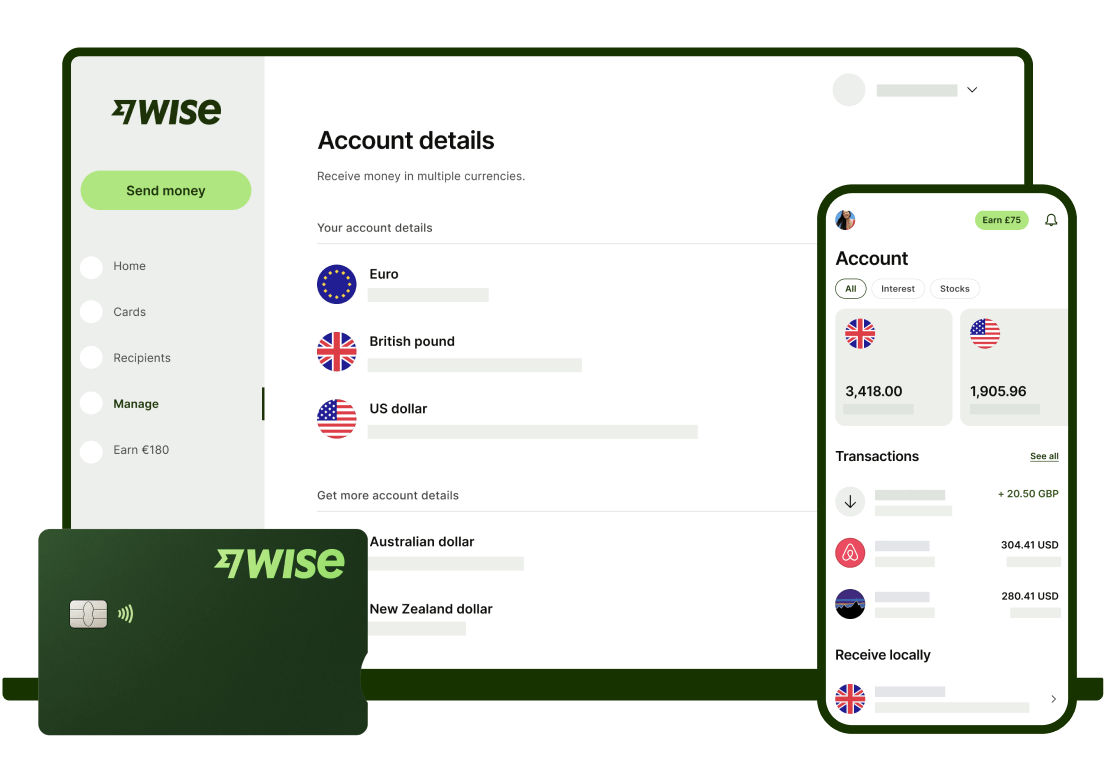HSBC Kinetic vs HSBC Business Account: Full Comparison
A complete head to head comparison for two HSBC account options for business: HSBC Kinetic vs Business Account, discover which is better for you.

If you’re setting up your own business or working as a freelancer, you’ll need access to some business tools. But should this include a sole trader business bank account?
In this guide, we’ll look at whether or not sole traders need to have a business bank account. We’ll also run through the potential benefits, as well as outline how a Wise Business account could potentially help your business if you are sending and receiving payments internationally.
Discover more about Wise Business💡
| 📑Table of contents |
|---|
Legally speaking, you don’t need a business bank account as a sole trader, freelancer or contracting (but not through a limited company)¹. Also if you’re doing gig work, such as Deliveroo or Uber, then you don’t need to open a business account.
You will, of course, have financial and tax responsibilities, but the law doesn’t require you to run your business finances through a dedicated business account.
If you prefer, you can carry on using your personal bank account for business transactions. But as your business grows, you may find this more difficult and feel you need to open a business bank account as a sole trader.
As your business grows, you may find it more difficult to separate business and personal finances. It may be a good idea to consider a business bank account if²:
You’re offsetting business expenses - if you’re offsetting costs such as travel, stationery or phone calls against your business, then it’s time to open a business account.
Your accounting becomes complicated and disorganised - You need to keep things clear and simple for accounting purposes, and for completing your tax return for HMRC. If your personal payments are mixed up with business expenses, this can make accurate calculations and record-keeping trickier.
**You want to look more professional ** - It can look a little unprofessional to use a personal bank account for business purposes. Ideally, clients should be making payments to an account held in the name of your business.
Your bank insists you switch to a business account. Most banks have terms and conditions for personal accounts stating that they mustn’t be used for business purposes. If there are a large number of business transactions passing through the account, this can raise a red flag. Your bank may get in touch and insist you open a business account instead.
You’re legally required to have a dedicated business account if you run either of the following business types:³
Limited company
Limited Liability Partnership (LLP)
Under UK law, all transactions relating to the running of these businesses must flow through a business account, and not a personal one.
If you do want to move money from a business account to a personal one (for example, to pay yourself a director’s salary), there are specific legal processes you’ll need to follow.
While it’s not mandatory for sole traders to have a business bank account, you will need one if you’re setting up a limited company as a sole trader.
It’s not just the legal structure of your business that affects your banking needs, however. If you plan to take customer card payments or apply for a business loan or funding grant, you’ll need to have a business bank account.
Most high street banks offer business bank accounts to sole traders. Some will have dedicated products just for sole traders, but most others are just ordinary business bank accounts.
If you’re planning to apply for a business account as a sole trader, there are a few things to bear in mind.
Business accounts differ from personal accounts. Firstly, in the fees they charge. While many personal accounts are free, business accounts usually come with a monthly charge or a per-transaction fee. However, it is possible to find business bank accounts for sole traders with an initial fee-free period.
You won’t usually earn much interest with a business account, but you will be able to access more advanced banking services. For example, a higher threshold for transactions, increased overdraft limit and a business credit card.
The main benefit of having a business account as a sole trader is clarity. Your business accounting and cash flow will be much more straightforward, which makes filing a tax return much easier. You’ll be able to be more organised with your financial planning, and spot potential problems with cashflow much earlier.
A business bank account is also a vital tool for a growing business. If you want to expand and start taking customer card payments or apply for a loan, you’ll be thankful you decided to open a business account. It also looks far more professional when dealing with other businesses.
Besides easier accounting, there are other perks on offer with sole trader bank accounts.
For example, you may be able to access specialist business support to help grow your business. The bank may give you discounts on professional products and services, such as accounting software for example. You’ll also be able to manage business risk by running credit reports on suppliers and other companies you work with.

You can usually send and receive international payments with both business and personal bank accounts, but there’s often a catch. Banks tend to charge high transaction and currency conversion fees, and you could also be stung by unfavourable exchange rates. If your business needs to send money to suppliers or get paid by overseas clients, this can make these transactions far more expensive.
But, there is an alternative that could save your business money on international payments.. Open a Wise Business account and you can send money worldwide in over 40 currencies for low fees and the mid-market exchange rate.
It’s an ideal option for freelancers, entrepreneurs and freelancers, as it lets you invoice like a local while avoiding high currency conversion fees.
You’ll even get a Wise Business debit card for those essential business purchases. And for easy cash flow management, you can seamlessly sync with accounting software like Xero.
Get started with Wise Business 🚀
So, should you get a business bank account as a sole trader? It all depends on the needs of your business. If you’re finding accounting a nightmare and you can manage the fees, a business bank account could be the way forward.
Sources used:
Sources checked on Apr 17, 2024
*Please see terms of use and product availability for your region or visit Wise fees and pricing for the most up to date pricing and fee information.
This publication is provided for general information purposes and does not constitute legal, tax or other professional advice from Wise Payments Limited or its subsidiaries and its affiliates, and it is not intended as a substitute for obtaining advice from a financial advisor or any other professional.
We make no representations, warranties or guarantees, whether expressed or implied, that the content in the publication is accurate, complete or up to date.

A complete head to head comparison for two HSBC account options for business: HSBC Kinetic vs Business Account, discover which is better for you.

Check a HSBC vs Barclays business banking head to head comparison for business in the UK. Rundown on fees, features and account options.

Doing business overseas? Discover the best multi-currency accounts in the UK to receive and send money abroad.

A comparison of Wise Business vs. Revolut Business, covering accounts, features, fees and more.

A guide to the Starling sole trader account vs. business account, comparing the two on features, fees and eligibility.

A helpful guide on how to close a Revolut Business account, including a step-by-step guide.